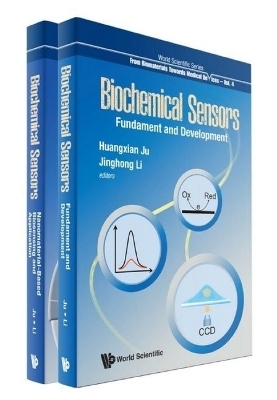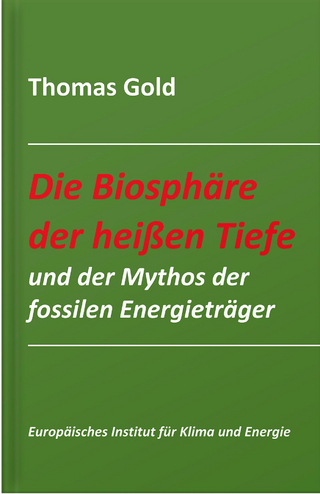
Biochemical Sensors
World Scientific Publishing Co Pte Ltd (Verlag)
978-981-12-3770-6 (ISBN)
By discussing recent advances, it is hoped this book will bridge the common gap between research literature and standard textbooks. Research into biochemical sensors and their biomedical applications is proceeding in a number of exciting directions, as reflected by the content. This book is published in honor of the 90th birthday of Professor Shaojun Dong, who performed many pioneering studies on modified electrodes and biochemical biosensors.
Huangxian Ju, Changjiang Professor, the director of State Key Laboratory of Analytical Chemistry for Life Science, Nanjing University; Fellows of the International Society of Electrochemistry and the Royal Society of Chemistry. Research interests include analytical biochemistry and nanobiosensing, focusing on signal amplification and life analytical chemistry. 730 papers in peer-reviewed journals (451 papers in journals with IF>5), 26 patents, 4 English books, 7 Chinese books, more than 34000 citations in SCI journals with an h-index of 94 (Google Scholar h-index 103), the first outstanding achievement award of Chinese chemical sensors in 2019, 3 first-class S&T prizes from Jiangsu Province Government, 3 first-class prizes in natural science from Education Ministry of China, 3 first-class S&T prizes from Chinese Association for Instrumental Analysis, 3 second-class and 2 third-class S&T prizes from Jiangsu Province Government. He is also the director of Electroanalytical Chemistry Committee, and vice director of Chemical Sensors Committee, Chinese Society of Instruments; vice directors of Analytical Chemistry Discipline Committee and Organic Analysis Committee, Chinese Chemical Society; vice director of Biosensor Biochip Nanotechnology Committee of Chinese Society of Bioengineering; chief editor of Frontiers in Chemistry: Analytical Chemistry, associate editors of Telomere and Telomerase, Sensors and Journal of Analysis and Testing. Jinghong Li, Academician of the Chinese Academy of Sciences, is currently a Cheung Kong Professor in the Department of Chemistry at Tsinghua University, China. He is the Head of Analysis Center, Tsinghua University. He received his B.Sc. from University of Science and Technology of China in 1991, and PhD from Changchun Institute of Applied Chemistry (CIAC), Chinese Academy of Sciences (CAS) in 1996. He was a postdoc or research scientist at University of Illinois at Urbana-Champaign, University of California at Santa Barbara, Clemson University, and Evonyx Inc., USA. He has been a professor at CIAC from May 2001 and Tsinghua University from July 2004. His current research interests include electroanalytical chemistry and bioanalysis, nanoanalysis and biosensing, physical electrochemistry and interfacial electrochemistry, material electrochemistry and nanoscopic electrochemistry, energy conversion and storage. He is an Associate Editor or Advisory Board member of Chem. Soc. Rev. (RSC), ACS Sensors (ACS), Biosensors and Bioelectronics, Current Analytical Chemistry, and Small Methods (Wiley-VCH). He has published over 400 papers in international peer-reviewed journals with >50,000 citations, giving him an h-index of 115. He is a Fellow of the Royal Society of Chemistry and a Highly Cited Researcher 2015–2020 in Chemistry, Materials (Thomson Reuters).
Biochemical Sensors I: Fundament and Development:Preface; Biochemical Sensors: Concept, Development and Signal Amplification; Aptamers-Based Biosensors; DNAzyme-Based Metal Sensing; Electrochemiluminescence Biochemical Sensors; Wearable Chem-Biosensing; Biofuel Cells for Self-Powered Electrochemical Sensors; Cell-Based Sensors; Fluorescent Probes for Imaging of Intracellular Active Small Molecules; Bioimaging and Biosensing in Near-Infrared-II Window; Galvanic Redox Potentiometry for In Vivo Sensing; Biochemical Sensors II: Nanomaterial-Based Biosensing and Applications:Preface; Au Nanoclusters Based Biosensors; Gold Coated Magnetic Nanoparticles as Dispersible Electrochemical Biosensors for Ultrasensitive Biosensing; Upconversion Luminescence Based Bio/Chemosensors; Carbon Nitride-Based Biosensors; Silicon-Based Optical Biochemical Sensors; Two-Dimensional Materials-Based Electrochemical Biosensors; Chemiluminescence Biosensors for Acute Myocardial Infarction Biomarkers; CRISPR-Cas Approaches for Diagnostic Applications; Advanced Electrochemical Tools for Single-Cell Exocytosis;
| Erscheinungsdatum | 10.08.2021 |
|---|---|
| Reihe/Serie | World Scientific Series: From Biomaterials Towards Medical Devices ; 4 |
| Verlagsort | Singapore |
| Sprache | englisch |
| Themenwelt | Naturwissenschaften ► Biologie ► Biochemie |
| Naturwissenschaften ► Chemie ► Analytische Chemie | |
| ISBN-10 | 981-12-3770-0 / 9811237700 |
| ISBN-13 | 978-981-12-3770-6 / 9789811237706 |
| Zustand | Neuware |
| Informationen gemäß Produktsicherheitsverordnung (GPSR) | |
| Haben Sie eine Frage zum Produkt? |
aus dem Bereich


